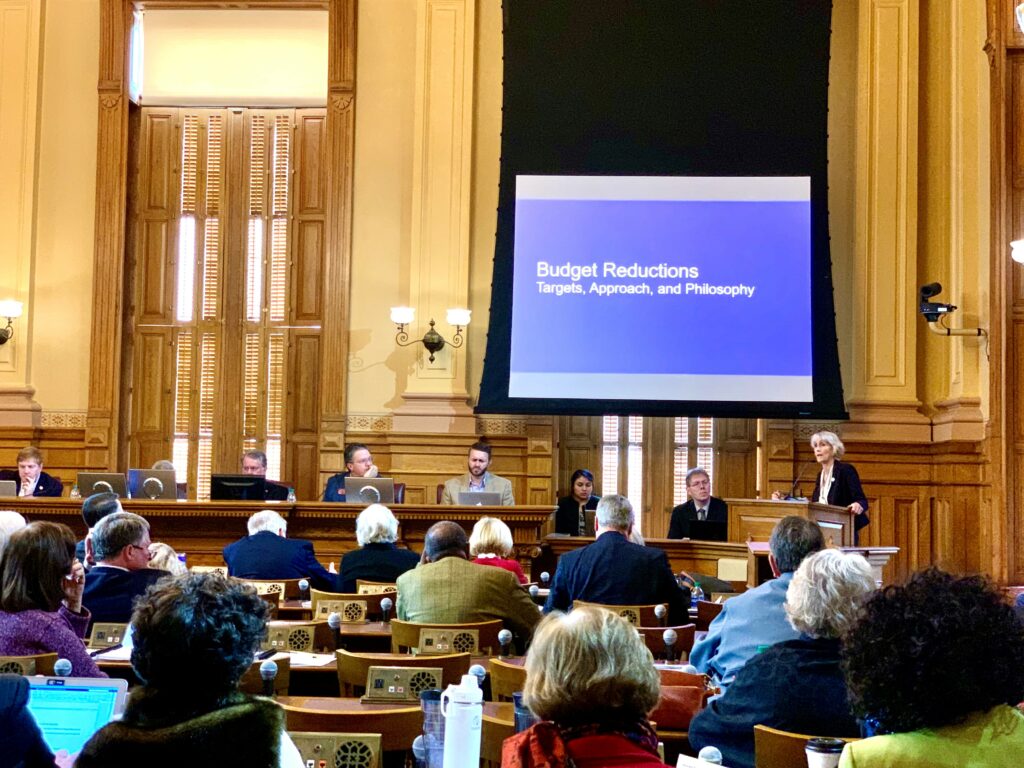
ATLANTA – State budget cuts could hit mental health services hard in Georgia, forcing behavioral health officials to pump more money into handling crisis situations instead of programs to prevent those situations, the state’s mental health chief said Thursday.
In three days of budget hearings this week, state agency heads said they plan to meet Gov. Brian Kemp’s orders for spending cuts mostly by eliminating vacant staff positions, upgrading technology and shifting funds between programs. Those cuts target behind-the-scenes work and, for the most part, would make little difference to the general public.
That’s not the case for the Department of Behavioral Health and Developmental Disabilities, said Commissioner Judy Fitzgerald. She told lawmakers Thursday that cuts totaling about $80 million through June 2021 would be felt by more than 200,000 people with mental health issues in Georgia the agency served last year.
“It was not possible for us to take the cuts without a reduction of services to individuals in the state,” Fitzgerald said.
The department drafted a memo last fall warning that some of the proposed cuts could risk “impacting increased suicidality, substance abuse disorders and demand on crisis services.” The memo highlighted how the cuts would especially hurt community service boards, which contract with the state to provide local mental health services in counties, cities and towns.
The cuts would largely affect so-called “core services” that fund programs to help mentally ill people stay in their homes and hold down jobs. Those services, done mostly by community service boards, aim to prevent health and behavioral emergencies that could land someone in jail or a psychiatric ward.
That preventative work has been the agency’s focus since 2010 under a settlement agreement with the U.S. Department of Justice to curb lengthy stays in psychiatric hospitals for Georgia’s mentally ill. Since then, admissions to the state’s five psychiatric hospitals have stopped. And lawmakers have approved more than $270 million to bolster the agency over the past decade.
But along with the cuts, Fitzgerald said the agency plans to shift $13 million to fund a growing demand for private psychiatric beds. Those funds were earmarked last year for preventative services but had to be diverted to the crisis beds as more of the state’s mentally ill seek intensive treatment, she said.
“The safety net is stretched to the max,” Fitzgerald said. “But we feel like we’re in this together.”
In August, a report from a federal monitor for the DOJ settlement urged state officials to boost funding for mental health services, not cut it. Fitzgerald declined to elaborate after Thursday’s meeting on whether the cuts and the $13 million shift to hospital beds might run afoul of the federal government.
“We’ll leave it to [the] Department of Justice and the lawyers to determine how that impacts compliance,” she said.
The governor’s office pushed back on Fitzgerald’s assessment of the cuts, arguing that staff in charge of the budgeting process reached different conclusions about the impacts.
“Commissioner Fitzgerald’s claims are not supported by our analysis, nor would we allow such a significant disruption in service to Georgians,” said Kemp’s communications director, Candice Broce.
Fitzgerald’s rundown of the cuts alarmed lawmakers on the House and Senate Appropriations committees.
Rep. Katie Dempsey, who chairs the House Appropriations subcommittee overseeing mental health, said she was startled to learn about details of the cuts and see the stark language used in last fall’s internal agency memo.
“The loss of services, it’s hard to even imagine right now how we’re going to deal with this,” said Dempsey, R-Rome.
Rural Georgia communities especially could suffer from fewer state dollars for mental health, said Rep. Darlene Taylor, R-Thomasville. She said crisis episodes involving mentally ill people in rural areas are on the rise, and budget cuts that hinder getting help for those people should not move forward.
“This budget, I cannot see how this is going to work,” Taylor said. “A spoonful of sugar is not going to make this go down.”
This story was updated to include comment from Gov. Brian Kemp’s office.